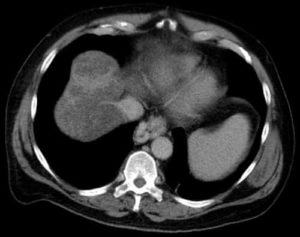

#Checkmate 9la brain metastases plus#
With a minimum follow-up of 36.1 months, nivolumab plus ipilimumab with chemotherapy continued to prolong OS versus chemotherapy alone in the intent-to-treat population (median OS: 15.8 versus 11.0 mo 3-y OS: 27% versus 19%). Exploratory analyses included systemic and intracranial efficacy in patients with or without baseline brain metastases, in addition to OS and PFS by KRAS, TP53, STK11, and KEAP1 somatic mutation status in patients with nonsquamous NSCLC. Assessments included OS, progression-free survival (PFS), and objective response rate. We report updated efficacy and safety (≥3 y of follow-up), clinical outcomes in patients with baseline brain metastases, and exploratory somatic mutation analyses.Īdults with stage IV or recurrent NSCLC, no known sensitizing EGFR or ALK alterations, and Eastern Cooperative Oncology Group performance status less than or equal to 1 were randomized 1:1 to nivolumab 360 mg every 3 weeks plus ipilimumab 1 mg/kg every 6 weeks with chemotherapy (two cycles) or chemotherapy alone (four cycles). All rights reserved.In the phase 3 CheckMate 9LA study, nivolumab plus ipilimumab with chemotherapy prolonged overall survival (OS) versus chemotherapy alone. Nivolumab plus ipilimumab revealed delayed deterioration and numerical improvement in symptoms and health-related quality of life versus chemotherapy in patients with advanced NSCLC and 1% or greater programmed death ligand 1 expression.įirst-line metastatic non–small cell lung cancer Ipilimumab Nivolumab Patient-reported outcomes Quality of life.Ĭopyright © 2021 International Association for the Study of Lung Cancer. Nivolumab plus ipilimumab had delayed time-to-first deterioration (hazard ratio 0.74 ) and a trend for more rapid time-to-first improvement (1.24 ) versus chemotherapy. Mixed-effect model repeated measures analyses revealed numerically greater improvements from baseline with nivolumab plus ipilimumab versus chemotherapy across LCSS average symptom burden index and 3-item global index, and EQ-5D VAS and utility index. population norm at week 24, remaining so throughout the treatment period. Mean on-treatment EQ-5D VAS scores for both treatments approached the U.K. On-treatment improvements from baseline in LCSS measures of symptom burden and global health status with nivolumab plus ipilimumab generally met or exceeded the minimal important difference (smallest clinically meaningful change) from weeks 24 and 30, respectively improvements with chemotherapy generally remained below the minimal important difference.

#Checkmate 9la brain metastases pro#
PRO completion rates were generally greater than 80%. Mixed-effect model repeated measures and time-to-first deterioration and improvement analyses were conducted. Changes in Lung Cancer Symptom Scale (LCSS) average symptom burden index, LCSS 3-item global index, EQ-5D visual analog scale (VAS), and EQ-5D utility index were analyzed descriptively. Patients (N = 1189) were randomized to nivolumab plus ipilimumab, nivolumab, or chemotherapy. We present the patient-reported outcomes (PROs). In CheckMate 227 ( NCT02477826), patients with treatment-naive stage IV or recurrent NSCLC and 1% or greater tumor programmed death ligand 1 expression had significantly improved overall survival with nivolumab plus ipilimumab versus chemotherapy. 18 Princess Alexandra Hospital, Woolloongabba, Australia.17 Adelphi Values, Boston, Massachusetts.16 Bristol Myers Squibb, Princeton, New Jersey.15 Sotiria General Hospital, National and Kaposistrian University of Athens, Athens, Greece.14 University Hospitals of Leicester NHS Trust, Leicester, United Kingdom.13 Mátrai Gyógyintézet, Mátraháza, Hungary.12 Oddzial Onkologii I Radioterapii Szpital Morski Im.11 Instituto Jalisciense De Cancerología, Guadalajara, Mexico.10 The Cancer Institute Hospital of Japanese Foundation for Cancer Research, Tokyo, Japan.9 Fundación Arturo López Pérez, Santiago, Chile.8 The Ohio State University, Columbus, Ohio.7 Metropolitan Hospital, Neo Faliro, Greece.6 Ambulatorium Chemioterapii, Bydgoszcz, Poland.5 Hôpital Sainte-Musse, Toulon, France.4 Sf Nectarie Oncology Center, Craiova, Romania.3 Seoul National University Bundang Hospital, Seongnam, Republic of Korea.Ion Chiricuta and UNF Iulia Hatieganu, Cluj-Napoca, Romania.

Electronic address: 2 Institutul Oncologic Prof.


 0 kommentar(er)
0 kommentar(er)
